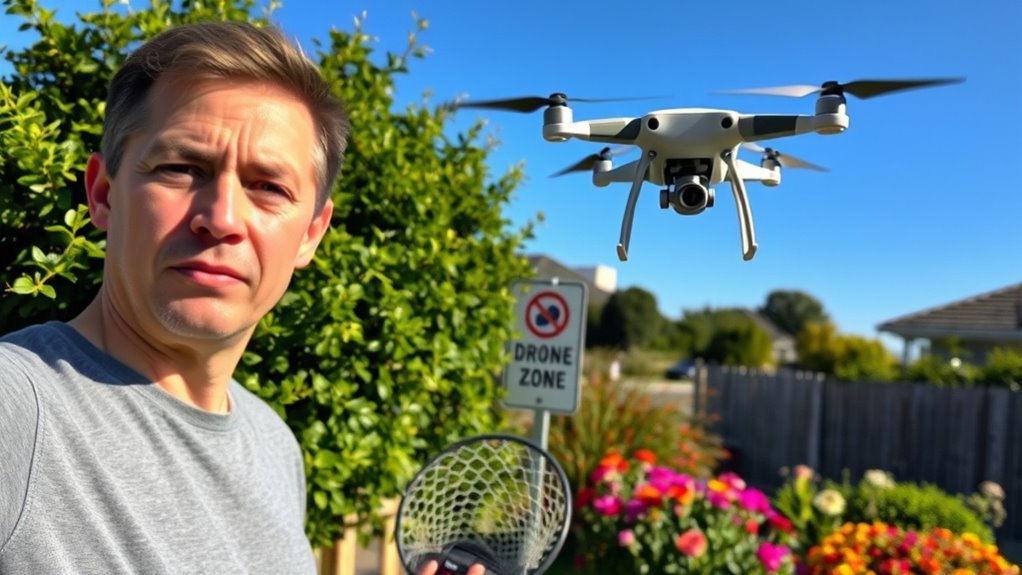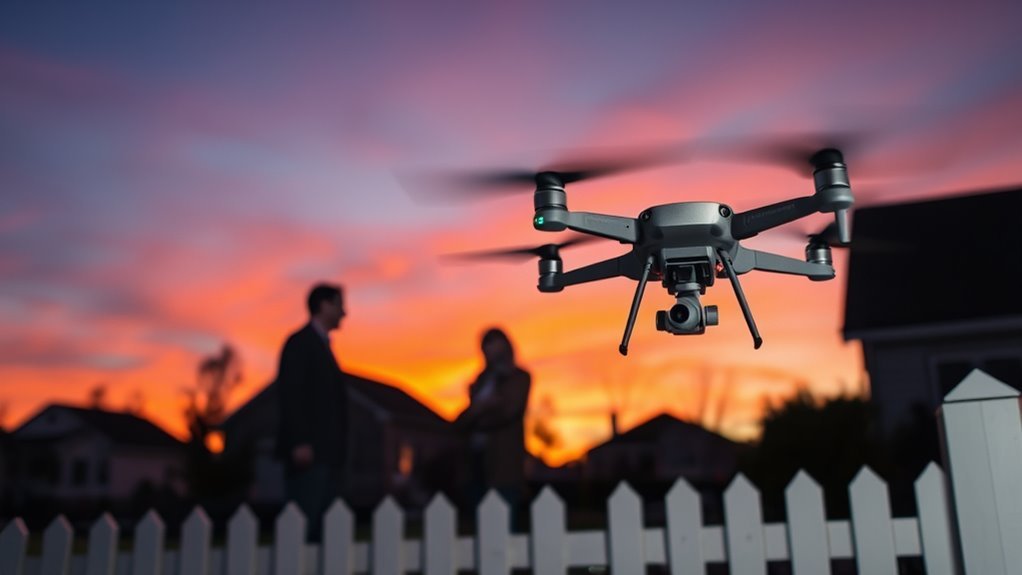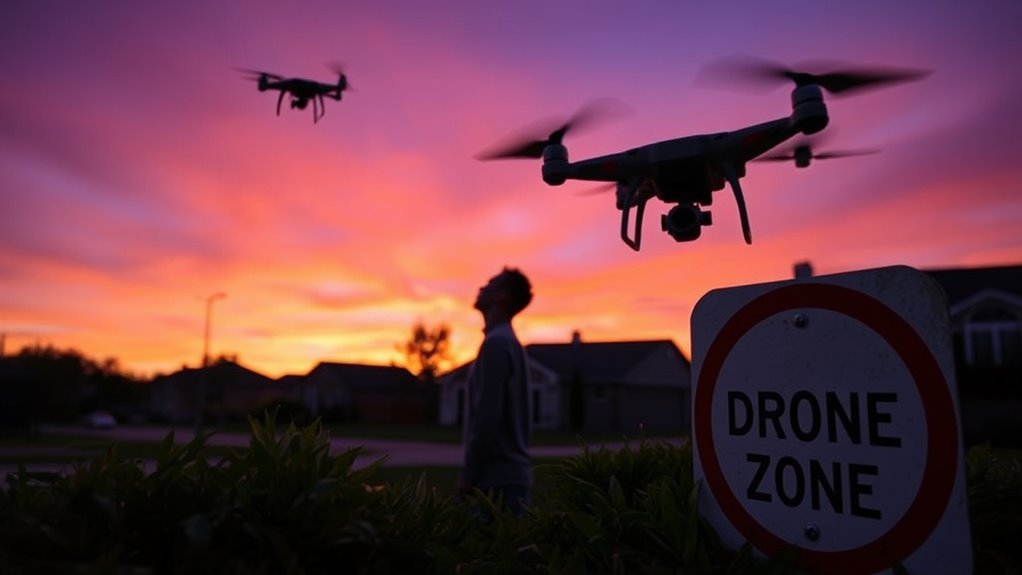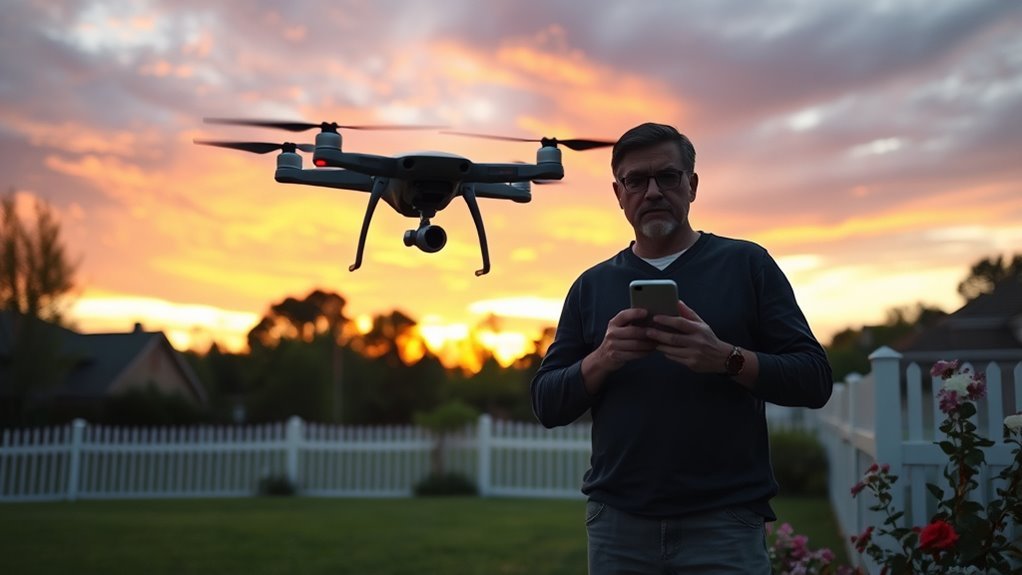In order to determine if it’s legal to shoot down a drone in your area, you need to understand local, state, and federal regulations. Different jurisdictions have varying laws regarding drone operations, and shooting one down could lead to serious legal consequences, including criminal charges. It’s crucial to know your property rights and airspace laws. If you’re unsure about the specifics, there are effective alternatives to evaluate, which can offer clarity on your rights and responsibilities.
Understanding Drone Laws in Your Area

Understanding the drone laws in your area is essential, especially if you’re considering taking action against an unauthorized drone. Different jurisdictions have varying regulations regarding drone ownership, which can greatly impact your options. Local enforcement agencies often prioritize specific laws that govern drone usage, making it vital for you to familiarize yourself with these rules. In many places, shooting down a drone could lead to severe legal repercussions, regardless of the drone’s intentions. You may find that local statutes protect drone operators’ rights as much as they do for property owners. Consequently, knowing your local laws can help you navigate this complex landscape while ensuring you maintain your freedoms without infringing on others’ rights.
Federal Regulations Governing Drones

When considering the legality of shooting down a drone, it’s essential to understand federal regulations governing their operation. The Federal Aviation Administration (FAA) sets specific rules that dictate how drones can be used, including airspace regulations that affect where they can fly. Familiarizing yourself with these guidelines will help clarify the legal landscape surrounding drone engagement.
Federal Aviation Administration Rules
The Federal Aviation Administration (FAA) governs the operation of drones in U.S. airspace through an extensive set of regulations designed to guarantee safety and security. These regulations promote aviation safety by establishing operational guidelines for recreational and commercial drone users alike. You should be aware that drone enforcement primarily focuses on compliance with these FAA rules, which include altitude restrictions, no-fly zones, and mandatory registration for certain drones. Violating these regulations can lead to significant penalties, emphasizing the importance of understanding the legal framework surrounding drone operations. If you’re considering taking action against a drone, knowing FAA regulations is vital, as they dictate what’s permissible and guarantee that your rights and safety are respected within the bounds of the law.
Airspace Regulations Overview
While maneuvering through the complexities of airspace regulations, it’s vital to grasp how federal laws specifically govern drone operations. The Federal Aviation Administration (FAA) categorizes airspace into various classifications, including controlled and uncontrolled zones. Each classification dictates specific drone restrictions, impacting where and how drones can operate. For instance, flying in controlled airspace typically requires prior authorization, while uncontrolled airspace may allow more freedom, provided you adhere to height and operational guidelines. Understanding these distinctions is important, as violating airspace regulations can lead to legal consequences. As you navigate your rights and responsibilities regarding drones, being well-informed about these federal standards will empower you to make decisions that align with both regulatory frameworks and your desire for freedom in the skies.
State-Specific Drone Laws

As drone technology evolves, understanding state-specific drone laws becomes critical for anyone considering the legality of shooting down a drone. Different states have varying regulations, and you’ll need to be aware of both state regulations and local ordinances that may apply. Here are four key considerations:
- State Laws: Some states explicitly prohibit shooting down drones.
- Local Ordinances: Cities may have stricter rules regarding drone activity.
- Intent: Your reasons for shooting down a drone can influence legality.
- Enforcement: Local law enforcement’s interpretation of drone laws can vary greatly.
Before acting, verify you’re informed about your state’s laws to avoid potential legal repercussions. Understanding these nuances is crucial for exercising your rights responsibly.
Property Rights and Airspace
Understanding property rights in relation to airspace is key when considering the legality of shooting down a drone. Generally, property ownership extends to the airspace above your land, but this ownership isn’t absolute. While you may have some rights to protect your property, federal regulations often govern airspace usage, complicating your ability to act against a drone. It’s vital to differentiate between legitimate property protection and actions that might violate aviation laws. If a drone trespasses into your airspace, you might feel justified in defending your space, but you could still face legal repercussions. As a result, it’s essential to understand the nuances of airspace ownership and consult local laws to guarantee your actions align with legal standards. Additionally, any attempt to shoot a drone could lead to criminal charges for destruction of federal property, further complicating your legal situation.
Privacy Concerns and Drones
How can you guarantee your privacy when drones are increasingly common in the skies? With the rise of drone surveillance, you might feel your personal space is under threat. Here are some key considerations regarding privacy invasion:
- Know your local laws: Familiarize yourself with regulations surrounding drone operations in your area, including compliance with privacy regulations that may dictate how drones can be used.
- Monitor drone activity: Be aware of drone flights near your property to assess potential surveillance incidents.
- Use privacy screens: Install barriers or screens in your yard to limit visibility from above.
- Engage with your community: Discuss privacy concerns with neighbors and advocate for local policies that protect personal space.
Additionally, it’s important to understand privacy laws to ensure that drone operators respect your rights and boundaries.
Staying informed and proactive can help you safeguard your privacy against unwanted drone surveillance while enjoying your freedom.
Self-Defense and Drone Interference
While drones can serve various purposes, including recreational use and aerial photography, their presence can also lead to situations where individuals may feel threatened or unsafe. Understanding self-defense laws is essential when it comes to drone interference. If you’re considering taking action against a drone, you must assess whether its behavior poses an imminent threat.
| Aspect | Consideration | Legal Implication |
|---|---|---|
| Threat Level | Is the drone invasive or aggressive? | Potential self-defense claim |
| Location | Are you in a private or public space? | Varies by jurisdiction |
| Response | What’s your intended action? | Legal consequences depend on action |
Navigating these factors can help guarantee you act within the law while protecting your personal space. Furthermore, it is crucial to remember that damaging or interfering with a drone may violate federal regulations that govern airspace safety and privacy.
Legal Consequences of Shooting Down a Drone
Shooting down a drone can lead to serious legal consequences, especially if the action is deemed unlawful. If you consider this course of action, be aware of potential ramifications, including:
- Criminal charges: You might face felonies or misdemeanors depending on the jurisdiction.
- Drone liability: If the drone belongs to someone else, you could end up liable for damages.
- Civil lawsuits: The drone operator could sue you for any losses incurred.
- Restricted defenses: Legal defenses for shooting down a drone may be limited, and proving necessity can be challenging.
Understanding these legal consequences is essential for safeguarding your rights and ensuring you act within the law. Always consider the implications before taking action against a drone.
Alternatives to Shooting Down a Drone
If you encounter an intrusive drone, consider alternatives to shooting it down. Reporting the incident to authorities can help address potential violations of privacy or safety. Additionally, using drone jammers or invoking privacy protection laws may effectively mitigate the situation without resorting to destructive measures.
Report to Authorities
When encountering a drone that poses a potential threat or invasion of privacy, reporting the situation to the authorities can often be a more effective and legal alternative than attempting to shoot it down. Follow these reporting procedures to engage local enforcement:
- Document the Incident: Take notes on the drone’s appearance, behavior, and location.
- Gather Evidence: If possible, capture photos or videos to support your claim.
- Contact Authorities: Reach out to local law enforcement or aviation authorities to report the drone.
- Provide Details: Share all relevant information, including the date, time, and specific concerns about the drone’s activities.
Use Drone Jammers
Reporting to authorities is often the preferred method for addressing concerns about intrusive drones, but there are also technological alternatives that can mitigate the threat without resorting to physical force. One such alternative is the use of drone jammers. These devices disrupt the communication signals between the drone and its operator, effectively grounding it. However, it’s important to understand the legal implications of using drone jammers in your area. In many jurisdictions, jamming signals is illegal and can lead to severe penalties. Before considering this option, research local laws and regulations to guarantee compliance. While drone jammers may provide a sense of control over your airspace, they come with risks that must be carefully weighed against their potential benefits.
Privacy Protection Laws
While some may consider shooting down a drone to protect their privacy, there are legal avenues available that can address such concerns more appropriately. Engaging with privacy protection laws can help you confront potential privacy violations stemming from drone surveillance. Here are some options you can explore:
- Report the Incident: Notify local authorities about the drone activity.
- Consult Legal Counsel: Seek advice on your rights regarding privacy violations.
- Utilize Local Ordinances: Investigate any regulations that specifically target drone surveillance.
- Engage in Advocacy: Support initiatives that strengthen privacy laws in your community.
These measures not only promote your freedom but also foster a safer environment without resorting to drastic actions that may lead to legal repercussions.
Frequently Asked Questions
Can I Report a Drone That’s Invading My Privacy?
If a drone’s invading your privacy, you can report it. Check local laws for reporting procedures and gather evidence. Understanding drone privacy regulations is essential in addressing your concerns effectively and ensuring your rights are protected.
What Should I Do if a Drone Crashes on My Property?
If a drone crashes on your property, remember that nearly 60% of drone incidents involve property damage. Prioritize safety, document the scene, and contact local authorities for proper drone recovery processes and potential liability assessments.
Are There Penalties for Misidentifying a Drone’S Owner?
If you misidentify a drone’s owner, you might face legal consequences. Misunderstanding drone ownership can lead to disputes, potential lawsuits, or fines, emphasizing the importance of accurately determining ownership before taking any action.
How Can I Legally Defend My Property From Drones?
When facing intrusive drones, your property rights matter deeply. However, drone regulations often complicate defense. Understanding local laws is essential to protect your freedom without risking legal repercussions. Always seek legal advice before taking action.
What Types of Drones Are Subject to Regulations?
When considering drone regulations, you’ll find that commercial drones typically face stricter rules than recreational drones. Understanding these distinctions helps you navigate legal boundaries and guarantee compliance while enjoying your freedom to engage with aerial technology.

